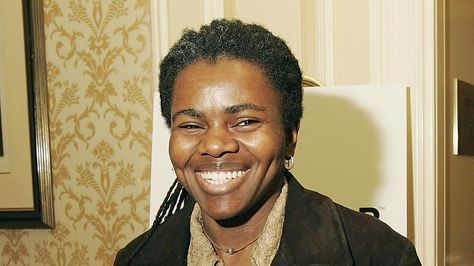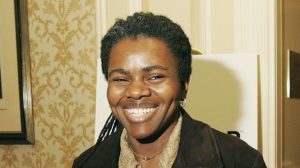Tracy Chapman

I’ll always remember the first time I ever heard “Fast Car.” I was about ten years old. My grandma and I had just been to the public library in a nearby town. We were about to pull out of the parking lot, when the song came on the radio. I was immediately entranced and I wrote down some of the lyrics so I could find the song later. I am not alone in my sentiment, as “Fast Car” is Tracy Chapman’s most popular song. It peaked at number six on the Billboard Hot 100 in 1988 and later received two Grammy nominations for “Record of the Year” and “Song of the Year.” The song, about a young woman who is dreaming of escaping poverty, was included in Rolling Stone Magazine‘s “500 Greatest Songs of All Time.”
Early Life
Tracy Chapman was born on March 30, 1964. She was raised in the inner-city of Cleveland, Ohio by her mother, after her parents divorced. When she was 8, her mother bought her a guitar, which led her to start playing music and songwriting. Not only was she talented, but she was smart, and won a scholarship to attend Wooster School, a private boarding school in Connecticut through President Kennedy’s A Better Chance Fund.
At Wooster School, she had her first run in with wealthy white people, some who had never met a poor person who grew up in a single-parent household like her. It was while attending Wooster School that she wrote “Talkin’ Bout a Revolution,” which would later be on her debut album and one of her most popular songs after “Fast Car.”
The racial discrimination and poverty that Chapman experienced later inspired her to study anthropology and African studies at Tufts University.
Activism
While at Tufts, Chapman began to perform her songs that reflected her own personal experiences growing up as a poor Black woman. She gained a following, and later a record deal in 1986. She released her first album in 1988.
While having socially-consicous lyrics and calls in her songs for change, she also performs for numerous charitable causes (i.e. Amnesty International, Farm Aid V).
A Breath of Fresh Air
A major part of what makes Chapman special is her image. In a time where big hair, glittery costumes, and synthesizers dominated music, she rejected it, and instead wore her hair in locs, and performed in a t-shirt, accompanying herself while singing. She is one of the few politicized artists, and regularly puts messages in her songs that humanizes the struggles of Black women, in a world that often overlooks it.
What Does This Say About Folk?
Chapman’s music reflects the ways that African Americans have traditionally used music to express themselves and their struggles. She rejects the excess of modern music and keeps it simple, which is what the folk genre is all about.
Works Cited
- Jenkins, Rasheedah Quiett, “The songs of black (women) folk: music, politics, and everyday living” (2008). LSU Doctoral Dissertations. 4048.
https://digitalcommons.lsu.edu/gradschool_dissertations/4048

Tracy Chapman
Tracy Chapman I’ll always remember the first time I ever heard “Fast Car.” I was about ten years old. My grandma and I had just

